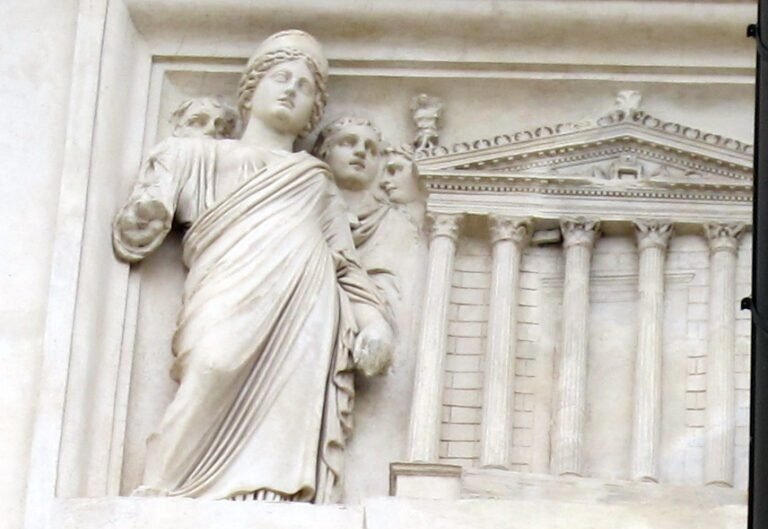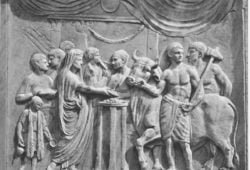Ancient Rome is both the city and the state it founded in Antiquity. This grouping of villages in the 8th century BC. BC managed to dominate the entire Mediterranean world and Western Europe from the 1st to the 5th century through military conquest and the assimilation of local elites. Its domination left important archaeological traces and numerous literary testimonies. It still shapes the image of Western civilization today. During these centuries, Roman civilization went from royalty to an oligarchic republic then to an autocratic empire.
The religion or religions of the Romans is the set of religious practices and beliefs that the Romans considered to be properly Roman (we can then speak of Roman religion), as well as the numerous cults imported or practiced by the populations forming part of the Empire. Roman. In Latin, the word religio does not mean religion but rather ritual obligation and is often used in the plural. This nuance must be kept in mind to avoid terminological confusion.
The Romans considered themselves deeply religious, and they attributed the success of their empire to their collective pietas (pietas) which allowed them to maintain good relations with the gods. According to the legendary history of Rome's early centuries, most religious institutions and rites date back to the early founders, particularly Numa Pompilius, the second king. Little by little, Roman law separated itself from religion.

Contents
ToggleFestivals and Rites of Ancient Rome
Holidays of the month
| Mymonday | Killtuesday | Wednesdaywednesday | ThuThursday | Frifriday | Satsaturday | Sunsunday |
|---|---|---|---|---|---|---|
31March 31, 2025 |
1April 1, 2025●(1 event) VeneraliaApril 1, 2025  On this day, the Romans celebrated Veneralia in honor of Venus Verticordia (who changes hearts) and Fortuna Virilis. Especially performed by women, the rites bring good fortune in matters of the heart, sex and marriage. #mythology #myth #legend #calendar #April 1 #tome #veneralia | 2April 2, 2025 | 3April 3, 2025 |
4April 4, 2025●(1 event) MegalesiaApril 4, 2025  On this day and for a week, the Romans celebrated the Megalesia in honor of a Phrygian goddess Cybele. Meals and extravagance were customary as well as stage games on the Palatine Hill. #mythology #myth #legend #calendar #4April #rome #megalesia | 5April 5, 2025 | 6April 6, 2025 |
7April 7, 2025 | 8April 8, 2025 | 9April 9, 2025 | 10April 10, 2025 | 11April 11, 2025 |
12April 12, 2025●(1 event) CerealiaApril 12, 2025  On this day and for a week, the Romans celebrated the games of Ceres (Demeter). The Greeks and Romans celebrated the return of Proserpine to earth, everyone, in those days, dressed in white. #mythology #myth #legend #calendar #April 12 #rome #athens | 13April 13, 2025 |
14April 14, 2025 |
15April 15, 2025●(1 event) FordicidiaApril 15, 2025  On this day, the Romans celebrated Fordicidia. To promote soil fertility, pregnant cows were sacrificed. This festival is part of the agrarian cycle celebrated in April, a month during which several other festivals relating to life take place. #mythology #myth #legend #calendar #April 15 #Rome #fordicidia | 16April 16, 2025 | 17April 17, 2025 | 18April 18, 2025 | 19April 19, 2025 | 20April 20, 2025 |
21April 21, 2025●(1 event) pariliaApril 21, 2025  On this day, the Romans celebrated Parilia, in honor of the goddess Palès, protector of shepherds. It was originally an agrarian festival, which included the purification by fire (lustration) of the herds and their guardians. #mythology #myth #legend #calendar #April 21 #Rome #parilia | 22April 22, 2025 |
23April 23, 2025●(1 event) VinaliaApril 23, 2025  On this day, the Romans celebrated the Vinalia. These two harvest festivals in honor of Jupiter and Venus took place in April and August. These festivals followed the natural course of the harvest, from the new wine festival to the first bunches picked. #mythology #myth #legend #calendar #rome #vinalia #23April #19August | 24April 24, 2025 |
25April 25, 2025●(1 event) RobigaliaApril 25, 2025  On this day, the Romans celebrated Robigalia. Created by the second king of Rome, this festival aims to protect crops from disease and promote soil fertility. #mythology #myth #legend #April 25 #calendar #robigalia #rome | 26April 26, 2025 |
27April 27, 2025●(1 event) FloraliaApril 27, 2025  On this day and for a week, the Romans celebrated floral games in honor of Flora, goddess of flowers, gardens and spring of Sabine origin. The cult of it was established in Rome by Titus Tatius, legendary king of Cures Sabini, then king of Rome at the same time as Romulus. #mythology #myth #legend #calendar #27April #rome #floralia |
28April 28, 2025 | 29April 29, 2025 | 30April 30, 2025 |
1May 1, 2025●(1 event) Bona DeaMay 1, 2025  On this day, the Romans celebrated Bona Dea. She was a goddess in ancient Roman religion. She was associated with the chastity and fertility of Roman women, healing and protection of the state and people of Rome. Its rites allowed women to use strong wine and blood sacrifice, things otherwise forbidden to them by Roman tradition. #mythology #myth #legend #calendar #romeantique #rome #bonadea #1May #3December | 2May 2, 2025 | 3May 3, 2025 | 4May 4, 2025 |
Cultural areas of ancient Rome
The main essential characteristic of Roman religious practices is orthopraxy, a cult based on the proper execution of rites and not on faith or belief in a dogma.
The Romans nevertheless had beliefs, starting with the effectiveness of their rites addressed to numerous divine powers, that is to say superhuman, the deities. These deities have fields of action which can be linked to a place or a function.
They can have a “topical power” (linked to a place) like Capitoline Jupiter (from Capitoline Hill) or Olympian Zeus (Olympia in Greece). But they can also have a so-called “functional” specialty, like Mars who is the “god of War” (military combat as well as for harvests against insects).
The Roman religion is distinguished from other Indo-European religions by the almost total absence of religious myths featuring their gods. As a result, the Roman gods present a strange face in many respects: on the one hand attention is focused on their power of action (numen) and their intervention in history, because they do not have "over -history » metaphysics; on the other, as a consequence, they are only pale, poorly personalized figures. They are first of all powers. And the Romans, lacking their own myths, will then adopt Greek myths.
The founding myth is that of Romulus and Remus, two brothers abandoned on the banks of the Tiber and miraculously nursed by a she-wolf. Romulus, armed with the extraordinary omen of the gods constituted by twelve vultures, traced the contours of the city on the Palatine and killed his brother after the latter had crossed the furrow with a mocking air. So Rome became for the Romans not only a living space but also consecrated ground.
According to Livy, it was after the reign of Romulus that Numa Pompilius, second king of Rome, established official religious practices. After the death of Romulus, he transferred part of the religious power of the king, then at the same time warrior, legislator and priest, to priestly colleges, selected from the Fathers, characters constituting the nobility chosen by Romulus. He founded the temple of Janus, extended the colleges of the Flamins, to Mars and to Quirinus, and created the order of the Salians. He appointed a high pontiff, religious leader responsible for the proper execution of the rites.